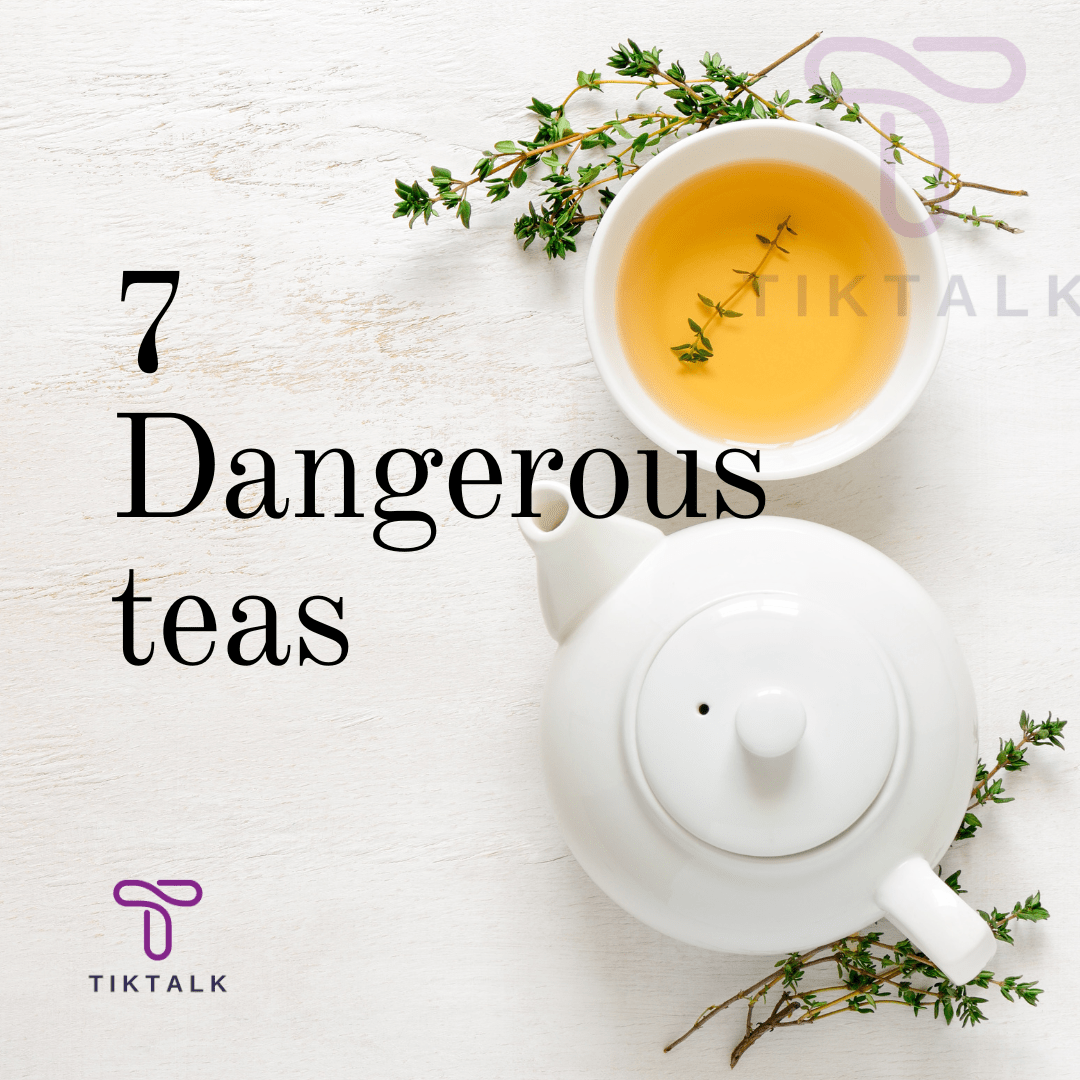7 Dangerous Teas You Should Never Drink
Hey there, tea lovers!
Today, we’re sipping on a different story, uncovering the hidden dangers in some popular dangerous teas.
We all cherish a good cup of tea for its warmth, flavors, and health benefits. But did you know that not all teas are as safe as they appear? Let’s dive into the darker side of our beloved brews and discover the seven dangerous teas that might be more risky than refreshing.
First off, let’s talk about how we often overlook teas when considering health hazards. Surprisingly, certain teas have been linked to some serious health complications. We’re taking in liver and lung damage, and in extreme cases, even comas.
These aren’t just rare occurrences; there’s consistent evidence out there, which is honestly quite alarming. Take, for example, a case reported in the Digestive Disease Sciences Journal: a severe instance of acute liver failure triggered by a so-called “slimming tea.” Did you know that some traditional teas can harbor bacterial and fungal contaminants? It’s a scary thought, especially considering how these beverages are often touted as health teas.
Now, don’t hit the panic button just yet. Our goal here is to make you aware, not afraid.
All right, ready for the list of five dangerous teas you should never drink? Each one comes with its own set of scientifically backed concerns.

Comfrey tea:
Despite its herbal heritage, this tea is a no-go due to its high levels of pyrrolizidine alkaloids, nasty stuff linked to liver and lung damage, and even cancer.
The more you consume comfrey tea over time, the more these alkaloids get stored in the liver, putting you in danger of liver toxicity. These compounds can even morph into toxic metabolites, increasing the risk of liver tumors.
Recent studies, such as one in the Journal of Hepatology in 2018, reported significant liver damage due to pyrrolizidine alkaloids. Another study in Alimentary Pharmacology and Therapeutics in 2020 also concluded similar results.
Comfrey teas are one among the dangerous teas you should avoid
Researchers are pretty worried about the safety of drinking this tea, and so are we.
Some Claimed Health Benefits of Comfrey Tea
Comfrey root and leaf-positive benefits are frequently mentioned due to the herb’s long history of use. The rumored benefits include:
- Scar reduction
- Wound healing
- Burn relief
- Treatment for rashes or insect bites
- Treatment of broken bones, sprains, strains
- Relief from general aches and pains
- Improved dental health (stronger teeth)
- Treatment of bronchitis
- Treatment for rheumatoid arthritis
- Relief from excessive menstrual flow
Note: It is not clear whether comfrey can provide these benefits. No strong scientific evidence has confirmed these benefits in humans.
Next on the list,
Lobelia tea/Indian Tobacco:
This one sounds exotic but carries significant health risks. Lobeline, its key compound, can cause severe symptoms like vomiting, irregular heartbeat, and in extreme cases, coma.
Lobelia tea, made from the lobelia plant, has long been used in traditional medicine to treat respiratory ailments. However, studies, including a study published in the Journal of Ethnopharmacology in 2010, indicate that lobelia contains chemicals that can affect heart health.
Lobeline stimulates the circulatory system, whereas other alkaloids such as isolobelianine and lobelanidine have comparable effects. These substances have the potential to alter specific receptors in the body, influencing heart rate and blood pressure, which is bad news for people who already have cardiac issues
Consuming this tea in large amounts can even lead to seizures.
Kombucha Tea:
Kombucha tea, a fermented drink produced from sweetened tea and a symbiotic culture of bacteria and yeast (SCOBY), has grown in popularity due to its possible health advantages, but certain claims are still being investigated.
This is a popular tea with a high probiotic content, although it can be difficult to brew at home.
Improper preparation might result in overfermentation or contamination, converting a beneficial drink into a health risk. It’s all about getting the brewing perfect on this one.
We also need to discuss the weight reduction detox and slimming teas. They promise speedy results but often involve Senna, a natural laxative that can cause persistent diarrhea, potassium imbalance, and cardiac problems.
Quick weight loss at the expense of your health? That’s a hard pass.
Some Claimed Health Benefits of Comfrey Tea
- Probiotic properties
- Improved digestion
- Detoxification
- Boosted immune system
- Increased energy
- Joint health support
- Antioxidant properties
- Weight loss support

Note: It is not clear whether comfrey can provide these benefits. No strong scientific evidence has confirmed these benefits in humans.
The next tea on my list is,
Pennyroyal tea:
It seems harmless but packs a dangerous punch with pulegone, a compound that can cause liver and lung damage, seizures, and kidney failure. This is a stark reminder that even herbal teas can be deceptive.

A study in the Journal of Medical Toxicology in 2011 highlighted cases of severe poisoning and fatalities due to pennyroyal tea consumption.
It’s crucial to remember that while these teas might not be harmful in small amounts or to everyone, the risks they pose are significant enough to warrant caution.
Foxglove Tea
Foxglove tea is made from the leaves of the foxglove plant, which contains digitalis, a compound used in heart medication. However, in its natural form, digitalis can cause serious health issues, including nausea, vomiting, hallucinations, and even death. It’s best to avoid this tea entirely due to its high toxicity.
Oleander Tea
Oleander tea is derived from the oleander plant, which is highly toxic. All parts of the plant contain cardiac glycosides, which can cause severe poisoning. Symptoms include nausea, vomiting, abdominal pain, and potentially fatal heart complications. The toxicity of oleander makes it extremely dangerous to consume.
Rhubarb Leaf Tea
Rhubarb leaf tea, made from the leaves of the rhubarb plant, is dangerous due to high levels of oxalic acid and anthraquinone glycosides. These compounds can cause severe poisoning, leading to symptoms like difficulty breathing, seizures, and kidney failure. Only the stalks of rhubarb are safe to eat, while the leaves should be avoided entirely.
Here are some of the claimed benefits of Rhubarb Leaf Tea:
- Digestive aid
- Detoxification
- Antioxidant properties
- Anti-inflammatory effects
- Weight management support
- Liver health support
- Skin health promotion
- Nutrient source

Note: It is not scientifically proven whether Rhubarb Leaf can provide these benefits.
Conclusion
Be informed and mindful about what goes into your cup of tea. We all love a comforting brew, but knowing what’s in it could make a huge difference to your health.
Now that you’re clued in on these potentially harmful teas, let’s pivot towards healthier choices. How about green tea, chamomile, or hibiscus? These are known for their health benefits and deliciousness. Remember, being informed empowers you to make better decisions about your tea selection, and that can have a big impact on your health. We’re curious to hear from you.
Have any of these teas given you trouble, or maybe you found a healthy tea that you swear by? Share your experiences, thoughts, or questions in the comments below. Let’s build a community where we can learn from each other and make smarter, healthier choices together. We can journey towards better health one cup of tea at a time.
Thanks for reading, and remember, stay informed, and stay healthy! 🍵




I’m always learning something new from your blog.
Thanks for the great tips!